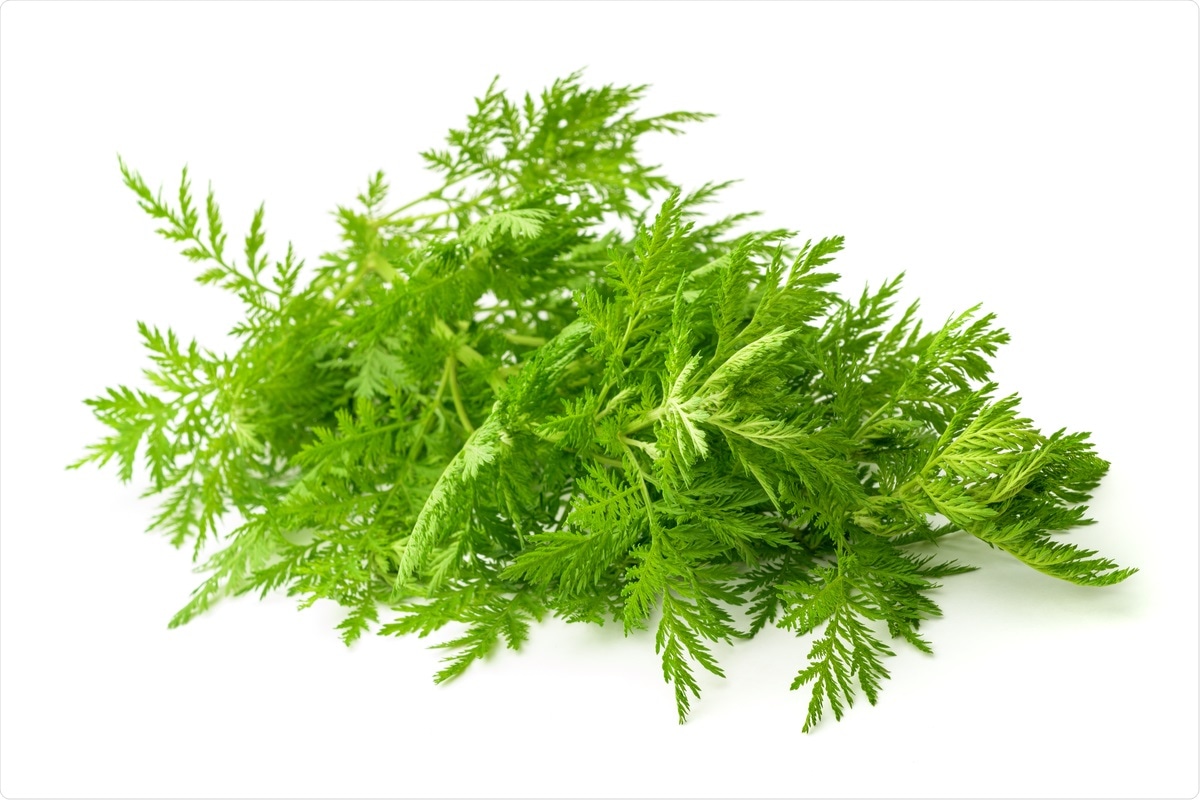A multinational research group has been the first to show the excellent activity of artemisinin-based treatment against the severe acute respiratory syndrome coronavirus 2 (SARS-CoV-2) in human cell lines – including a specific type of lung cells. Their findings were recently published in the journal Scientific Reports.
Notwithstanding the increasing availability of vaccines against the coronavirus disease 2019 (COVID-19), we are still in need for effective and affordable treatments. There were many attempts to repurpose drugs that we already use for a myriad of different indications but to not much avail.
Artemisinin is one of many bioactive compounds present in the plant known as Artemisia annua, and is currently used as an active ingredient to treat malaria. Moreover, its derivates, artesunate, and artemether come with even better pharmacokinetic traits, which is why they are pervasively used in various anti-malaria combination treatments around the world.
Considering their excellent safety profiles in humans, as well as their potential for worldwide distribution at relatively low costs, artemisinin-based drugs appear to be an attractive repurposing drug candidate for COVID-19.
However, while an antiviral potential of artemisinin, its derivatives, and plant extracts have been demonstrated for several viral groups, it is still not clear whether they would actually be viable in the treatment of COVID-19 due to their elusive mechanisms of action.
This new study, led by Dr. Yuyong Zhou from the University of Copenhagen in Denmark and Dr. Kerry Gilmore from the Max Planck Institute for Colloids and Interfaces in Germany, aimed to appraise whether Artemisia annua extracts – but also pure artemisinin, artesunate and artemether – are active against SARS-CoV-2 in the laboratory conditions.
.jpg)
Study: In vitro efficacy of artemisinin-based treatments against SARS-CoV-2. Image Credit: wasanajai / Shutterstock
Different strains, different cell lines
Initially, several extracts of Artemisia annua and artemisinin were screened for antiviral activity using a plaque-reduction assay in VeroE6 cells (i.e., a specific type of an African green monkey kidney cell line). This was done in a pretreatment setting by using a German SARS-CoV-2 strain from Munich.
This step informed further experiments where three Artemisia annua extracts (together with pure, synthetic artemisinin, artesunate and artemether) were investigated to demonstrate concentration-response curves for extracts and compounds in both pretreatment and treatment settings by using multiple replicates. Here, the researchers have used a Danish SARS-CoV-2 strain from Copenhagen, also in VeroE6 cells.
Finally, the efficacy of the aforementioned extracts and compounds against the Danish SARS-CoV-2 strain has been confirmed in Huh7.5 (a cell line of immortal epithelial-like tumorigenic hepatoma cells) and A549-hACE2 cells (lung cancer cells expressing human angiotensin-converting enzyme 2).

Image Credit: Scisetti Alfio / Shutterstock Background
Successful inhibition of SARS-CoV-2
Here, it was shown that the treatment with all studied extracts and compounds successfully inhibited SARS-CoV-2 infection of VeroE6, human hepatoma Huh7.5 and human lung cancer A549-hACE2 cell lines – without an evident impact of used cells on observed antiviral efficacy.
In treatment assays that were used, artesunate proved to be the most potent, with a range of 50% effective concentrations (EC50) in different cell types between 7 and 12 µg/mL. This was followed by artemether with a range between 53 and 98 µg/mL, Artemisia annua extracts with the range between 83 and 260 µg/mL, and finally artemisinin with a range from 151 to at least 208 µg/mL.
Moreover, the selectivity indices (calculated based on cell viability and treatment assays) were largely below ten, implying a relatively small therapeutic window. Further experiments have shown that artesunate targeted SARS-CoV-2 at the post-entry level, with the possibility to achieve peak plasma concentrations that exceed EC50 values for this compound.
From bench to bedside?
In a nutshell, this study was actually the first to show the potent activity of artemisinin-based treatment against different types of SARS-CoV-2 in human cell lines, which includes a specific type of lung cells.
“In our study, we confirm the efficacy of artemisinin-based treatment for two European SARS-CoV-2 strains from Germany and Denmark, which are more closely related to the majority of SARS-CoV-2 strains circulating worldwide than the Wuhan strain”, emphasize study authors in this manuscript published in the Scientific Reports journal.
Of course, now we need clinical studies to further assess the exact utility of these compounds as potential therapeutics against COVID-19. Still, the results of this research endeavor are somewhat encouraging as we are entering phase I/II clinical trials.